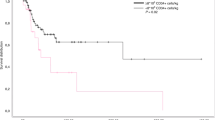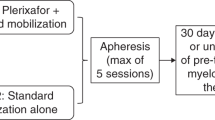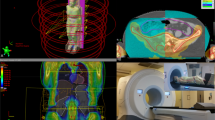Abstract
The purpose of this trial was to study feasibility and tolerance of a dose-intensive multicyclic alternating induction chemotherapy with repeated stem cell support in a series of 43 metastatic breast cancer patients. Anthracycline-naive patients (n = 21) received cyclophosphamide 2.5 g/m2 plus doxorubicin 80 mg/m2 alternating every 14 days with paclitaxel 200–350 mg/m2 plus cisplatin 120 mg/m2. Patients who had previously received anthracyclines (n = 22) received cisplatin 120 mg/m2 plus etoposide 600 mg/m2 alternating with paclitaxel 200–350 mg/m2 plus ifosfamide 8 g/m2. Peripheral blood stem cells were infused after every course except the first, with a median CD34+ dose of 2.1 × 106/kg per cycle. Positive selection of CD34+ cells was performed in good mobilizers. The median number of cycles administered was six (4–8), and the time interval between them was 17 days. Median summation dose intensities (SDI) actually administered for the CA-TP and PE-TI protocol were 4.95 and 4.69, respectively (87% of scheduled SDI). There were 15 complete (35%) and 21 partial responses (49%), for an overall response rate of 84% (95% CI, 73%–95%). Infection or neutropenic fever occurred in 50% of the cycles. There was one treatment-related death. After a median follow-up of 26 months, the median event-free-survival was 12 months (95% CI: 10–14) and overall survival was 31 months. These high dose-intensity induction treatments seem to be feasible with sequential stem cell support. Bone Marrow Transplantation (2001) 28, 235–242.
This is a preview of subscription content, access via your institution
Access options
Subscribe to this journal
Receive 12 print issues and online access
$259.00 per year
only $21.58 per issue
Buy this article
- Purchase on Springer Link
- Instant access to full article PDF
Prices may be subject to local taxes which are calculated during checkout






Similar content being viewed by others
References
Hryniuk W, Bush H . The importance of dose intensity in chemotherapy of breast cancer J Clin Oncol 1984 2: 1281–1288
Hryniuk W, Free E, Wright FA . A single scale for comparing dose-intensity of all chemotherapy regimens in breast cancer: summation dose-intensity J Clin Oncol 1998 16: 3137–3147
Stadtmauer EA, O'Neill A, Goldstein L et al. Conventional-dose chemotherapy compared with high-dose chemotherapy plus autologous hematopoietic stem-cell transplantation for metastatic breast cancer New Engl J Med 2000 342: 1069–1076
Peters WP, Jones RB, Vredenburgh J et al. A large, prospective, randomized trial of high-dose combination alkylating agent (CPB) with autologous cellular support (ABMS) as consolidation for patients with metastatic breast cancer achieving complete remission after intensive doxorubicin-based induction therapy (AFM) Proc Am Soc Clin Oncol 1996 15: 149a
Lotz JP, Cure H, Janvier M et al. Intensive chemotherapy and autograft of hematopoietic stem cells in the treatment of metastatic cancer: results of the national protocol Pegase 04 Hematol Cell Ther 1999 41: 71–74
Teicher BA, Holden SA, Elder SP et al. Influence of schedule on alkylating agent cytotoxicity in vitro and in vivo Cancer Res 1989 49: 5994–5998
Norton L . A Gompertzian model of human breast cancer growth Cancer Res 1988 48: 7067–7071
De Vita VT, Schein PS . The use of drugs in combination for the treatment of cancer: Rationale and results New Engl J Med 1973 288: 998–1006
Shea TC, Mason JR, Storniolo AM et al. Sequential cycles of high-dose carboplatin administered with recombinant human granulocyte–macrophage colony-stimulating factor and repeated infusions of autologous peripheral-blood progenitor cells: a novel and effective method for delivering multiple courses of dose-intensive therapy J Clin Oncol 1992 10: 464–473
Shapiro CL, Ayash L, Webb IJ et al. Repetitive cycles of cyclophosphamide, thiotepa and carboplatin intensification with peripheral blood progenitor cells and filgrastim in advanced cancer patients J Clin Oncol 1997 15: 674–683
Pettengell R, Woll PJ, Thatcher N et al. Multicyclic, dose-intensive chemotherapy supported by sequential reinfusion of hematopoietic progenitors in whole blood J Clin Oncol 1995 13: 148–156
Honkoop AH, van der Wall E, Feller N et al. Multiple cycles of high-dose doxorubicin and cyclophosphamide with G-CSF mobilized peripheral blood progenitor cell support in patients with metastatic breast cancer Ann Oncol 1997 8: 957–962
Gluck S, Ross AA, Layton TJ et al. Decrease in tumor cell contamination and progenitor cell yield in leukapheresis products after consecutive cycles of chemotherapy for breast cancer treatment Biol Blood Marrow Transplant 1997 3: 316–323
Pérez-Calvo J, Martín-Algarra S, García-Rayo S et al. Multicyclic semi-intensive chemotherapy with sequential stem cells support: relevance of CD34 dose Blood 1997 90: (Suppl. 1) 334b (Abstr. 4251)
Hryniuk W . Dose intensity In: Schilsky RL, Milano GA, Ratain MJ (eds) Principles of Antineoplastic Drug Development and Pharmacology Marcel Dekker: New York 1996 pp 263–279
Hayward JL, Carbone PP, Hensen JC et al. Assessment of response to therapy in advanced breast cancer Br J Cancer 1977 35: 292–298
Petersen FB, Bearman SI . Preparative regimens and their toxicity In: Forman SJ, Blurre KG, Thomas ED (eds) Bone Marrow Transplantation Blackwell Scientific Publications: Boston, MA 1994 pp 79–89
Miller AB, Hoogstraten B, Staquet M et al. Reporting results of cancer treatment Cancer 1981 47: 207–214
Nieto Y, Cagnoni PJ, Bearman SI et al. Acute encephalopathy: a new toxicity associated with high-dose paclitaxel Clin Cancer Res 1999 5: 481–486
García-Rayo S, Pérez-Calvo J, Martin S et al. A phase II study of high dose intensity based chemotherapy with repeated stem cell support in advanced, relapsed and refractory ovarian cancer Proc Am Soc Clin Oncol 2000 19: 395a (Abstr. 1562)
Martínez-Aguillo, Pérez-Calvo J, Villafranca E et al. Feasibility of sequential dose-intensive chemotherapy with stem cell support in poor-prognosis Ewing's sarcoma Proc Am Soc Clin Oncol 2000 19: 563a (Abstr. 2217)
Pérez-Calvo J, Martínez Aguillo M, García-Rayo S et al. Factors determining the actually received dose intensity in a program of multicyclic dose-intensive alternating chemotherapy with sequential stem cell support Acta Haematol (in press)
Schwartzberg L, Birch R, Blanco R et al. Rapid and sustained hematopoietic reconstitution by peripheral blood stem cell infusion alone following high-dose chemotherapy Bone Marrow Transplant 1993 11: 369–374
Fields KK, Elfenbein GJ, Trudeau WL et al. Clinical significance of bone marrow metastases as detected using the polymerase chain reaction in patients with breast cancer undergoing high-dose chemotherapy and autologous bone marrow transplantation J Clin Oncol 1996 14: 1868–1876
Ross AA . Minimal residual disease in solid tumor malignancies: a review J Hematother 1998 7: 9–18
Cooper BW, Moss TJ, Ross AA et al. Occult tumor contamination of hematopoietic stem-cell products does not affect clinical outcome of autologous transplantation in patients with metastatic breast cancer J Clin Oncol 1998 16: 3509–3517
Solano C, Badia B, Lluch A et al. Prognostic significance of the immunocytochemical detection of contaminating tumor cells (CTC) in apheresis products of patients with high-risk breast cancer treated with high-dose chemotherapy and stem cell transplantation Bone Marrow Transplant 2001 27: 287–293
Engelsman E, Klijn JCM, Rubens RD et al. ‘Classical’ CMF vs a 3-weekly intravenous CMF schedule in postmenopausal patients with advanced breast cancer Eur J Cancer 1991 27: 966–970
Ardizzoni A, Venturini M, Sertoli MR et al. Granulocyte–macrophage colony-stimulating factor (GM-CSF) allows acceleration and dose-intensity increase of CEF chemotherapy: a randomized study in patients with advanced breast cancer Br J Cancer 1994 69: 385–391
Carter DL, Marks LB, Bean JM et al. Impact of consolidation radiotherapy in patients with advanced breast cancer treated with high-dose chemotherapy and autologous bone marrow rescue J Clin Oncol 1999 17: 887–893
Acknowledgements
The authors are indebted to Dr William M Hryniuk for his counseling in dose-intensity calculations, to the nursing and medical staff of the Department of Oncology and Cell Therapy Area for the clinical care of the patients and to Mr David Carpenter for editorial assistance.
Author information
Authors and Affiliations
Rights and permissions
About this article
Cite this article
García-Rayo, S., Pérez-Calvo, J., Martín-Algarra, S. et al. Multiple cycles of dose-intensive chemotherapy with repeated stem cell support as induction treatment in metastatic breast cancer: a feasibility study. Bone Marrow Transplant 28, 235–242 (2001). https://doi.org/10.1038/sj.bmt.1703125
Received:
Accepted:
Published:
Issue Date:
DOI: https://doi.org/10.1038/sj.bmt.1703125



